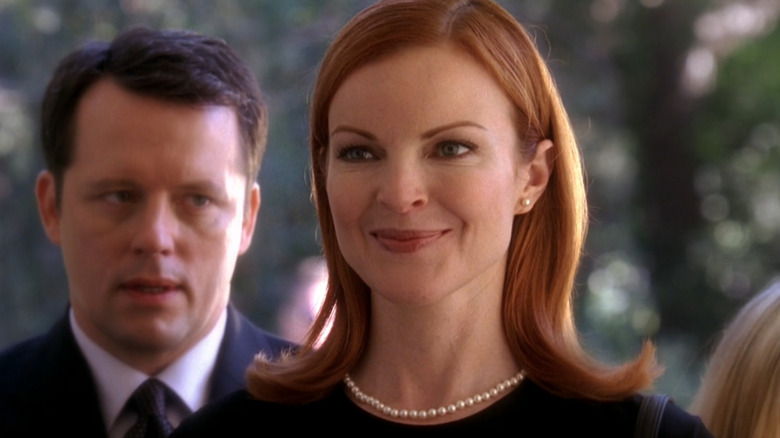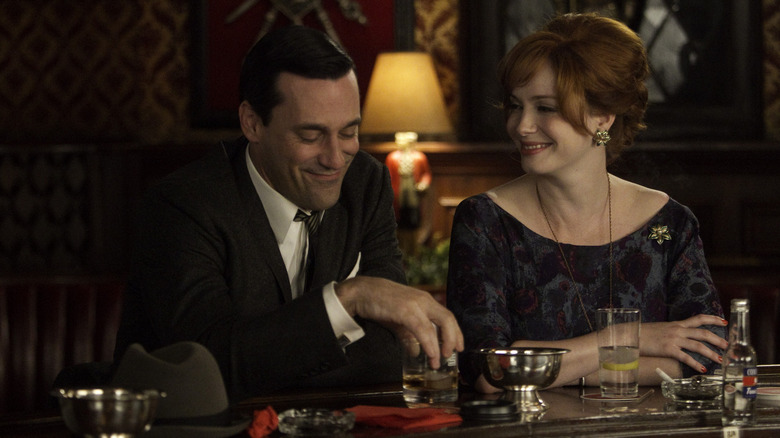HBO Turned Down One Of The Most Beloved Shows Of The 2000s
The good people at HBO have a long history of making smart decisions. They greenlit five seasons of "The Wire" even though the show was never a ratings hit, a decision that has paid off massively in the years that followed. They took a gamble on "Game of Thrones," even though in the mid-2000s it wasn't yet clear if a high-budget incest-heavy fantasy series would rake in good money. The HBO execs seem to have a good eye for what'll perform well both in terms of ratings and critical acclaim, which is why it's so surprising to hear about the good ideas they overlooked.
Case in point: "Desperate Housewives," the long-running dramedy series that became a smash hit straight out of the gate, was originally pitched to HBO. As The Telegraph reported in 2004, "Elegant it may be, but that didn't stop it being turned down by several networks – CBS, NBC, Fox, HBO, Showtime and Lifetime. Only ABC, its own drama output down the pan, has little to lose."
Most of those networks listed don't raise many eyebrows, but HBO and Showtime do. Those are the channels that are free from a lot of the usual restraints of network TV; for a show as risqué as "Desperate Housewives," it's tempting to wonder what an HBO version of the series could've looked like. A Showtime version could've also been extra scandalous, but at least we know HBO wouldn't have dragged the show out for 8 seasons (like ABC did with "Desperate Housewives" and as Showtime did with most of its best shows).
Desperate Housewives is not the only show that could've (and should've) been on HBO
There are a lot of boundary-pushing network shows out there that inevitably raise the question: what if this was on HBO? It's impossible not to wonder about a version of "Desperate Housewives" where the characters could realistically curse, or if all those surprise pregnancy storylines could've taken abortion seriously as an option for the characters (as the showrunners wanted).
Fans of "Twin Peaks," another series that goes to some insanely dark places despite its initial respectable veneer, have often wondered the same thing. Although at least those fans sort of got their answer in 2017, when "Twin Peaks: The Return" aired not on ABC but on Showtime, and it did not hold back on the gore/profanity/nudity.
One of the other big "What if?" moments in TV history concerned "Mad Men." It was a show that centered around a sex addict, but thanks to it airing on AMC it wasn't allowed to show any nudity. It's an issue that becomes more noticeable once you find out that showrunner, Matt Weiner, had previously written for HBO's "The Sopranos," and had pitched "Mad Men" to the HBO execs at the height of "The Sopranos" fame. Even though everything we know about HBO implies they'd be interested in this sort of TV show, they passed.
But with both "Mad Men" and "Desperate Housewives," there's at least an argument to be made that the shows benefitted from their restrictions. Both shows got creative with how they worked around the censors, and their 42-minute episodes kept their pacing tight. Fans of both shows have also argued that the implication of sexuality is often more alluring than sexuality itself, so the intrigue of both series is higher due to what they aren't allowed to show. Is this a fair argument, or is it just sour grapes? It's hard to say, but with "Mad Men" going strong for seven seasons and "Desperate Housewives" lasting for eight, it's clear that both shows did just fine for themselves without HBO's help.

